2014 – The Anglicans to Watch
Following on from last year, here’s my top ten Anglicans who I believe will have an impact on the Church of England in 2014 (and beyond). For some it may be for things that will happen over the next twelve months that will involve them, for others it’s about their ongoing “riseâ€.
Bubbling Under
Before we start the top ten, it’s just worth mentioning a few names I considered but didn’t include in the final list.
- Rt Revd Keith Sinclair – The Bishop of Birkenhead’s “minority report” on the Pilling Commission was an impressive demonstration of theological acumen and missional critique. He has fastidiously refused to comment any further on it, but we might see more from him in 2014 on this subject.
- Revd Arun Arora – In our top ten last year and still bubbling under this year, Arun has taken the Communications Department at Church House through some dramatic changes this year.
- Right Revd Tony Robinson – The Chair of the Society of Saint Wildred and Saint Hilda, the Bishop of Pontefract is one of the leading anglo-catholics in the country. The Society isn’t going away and Women Bishops is just going to make the divisions in the Church more obvious.
- Revd Paul Perkin – His speech at GAFCON Nairobi was incredibly well received and if things go badly very quickly (see number 6 on the list) you will see a lot more of this leading light in the Anglican Mission in England.
Number 10 – Rt Revd Tim Dakin
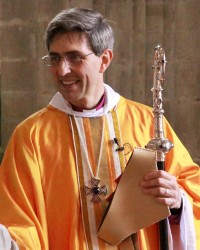 Rumour has it 2014 is not going to be a good year for the Bishop of Winchester. A fast rise to one of the key episcopal positions in the land was undermined by the trouble in Jersey in 2013. One pastoral inquiry, two reports (one of which is currently suppressed to great consternation) and then an Arch-Episcopal visitation are not the signs of a healthy pastoral relationship. It could be that very early in the New Year Guernsey and Jersey will be removed from the Diocese of Winchester altogether in preparation for the creation of a new diocese of the Channel Islands in 2015.
Rumour has it 2014 is not going to be a good year for the Bishop of Winchester. A fast rise to one of the key episcopal positions in the land was undermined by the trouble in Jersey in 2013. One pastoral inquiry, two reports (one of which is currently suppressed to great consternation) and then an Arch-Episcopal visitation are not the signs of a healthy pastoral relationship. It could be that very early in the New Year Guernsey and Jersey will be removed from the Diocese of Winchester altogether in preparation for the creation of a new diocese of the Channel Islands in 2015.
Add on top of that the sudden departure of Stephen Collyer, the Director of Finance & Assistant Diocesan Secretary, and an almost half a million pounds black-hole in the annual budget (partly due to the withdrawal of funds from the Channel Islands) and things are not looking that great in Hampshire. On the upside, Dakin ran a particularly successful Mission Conference for the Diocese and Winchester boasts within its boundaries some great examples of large and growing successful churches (for example Christ Church in Winchester).
It’s been a rocky first few years since Dakin was installed as the Diocesan, and he inherited in Jersey a legal disaster just waiting to happen with separate Canons and a deeply independent establishment on both islands. If Dakin can move on from mistakes made and problems inherited, he has the possibility of being a key leader in the Church of England, especially as a conservative he will not be happy with some of the suggestions in Pilling.
Number 9 – Colin Coward
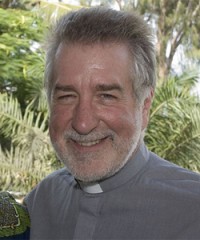 Oh dear. How the less than mighty have fallen. Last year’s number three is this year’s number nine and he barely made it into out list at all. Colin has been increasingly grumpy over the past few months, disappointed by how Pilling didn’t deliver anything near what he wanted. It’s an open secret that he got told off by Sir Joseph Pilling during his presentation to the Committee on Human Sexuality and he’s put quite a few people in the middle ground off by his constant insistence that the traditional position on human sexuality is intrinsically homophobic and irredeemable. How not to win friends and influence people.
Oh dear. How the less than mighty have fallen. Last year’s number three is this year’s number nine and he barely made it into out list at all. Colin has been increasingly grumpy over the past few months, disappointed by how Pilling didn’t deliver anything near what he wanted. It’s an open secret that he got told off by Sir Joseph Pilling during his presentation to the Committee on Human Sexuality and he’s put quite a few people in the middle ground off by his constant insistence that the traditional position on human sexuality is intrinsically homophobic and irredeemable. How not to win friends and influence people.
It’s hard to be part of a facilitated listening process when it seems that every thread on your Facebook page descends into calls of bigotry and homophobia against your opponents. Last year I said that 2013 was Colin’s to make or break and unfortunately for him it seems to be the latter. Changing Attitude might still have a role to play in the debates that are to happen in the Church of England, but if so they are going to have to learn better ways of dealing with the likes of the Living Out team than name-calling and dismissive arrogant public positions.
Number 8 – The Lambeth Palace Press Team
 One of the first things Justin Welby did on being appointed Archbishop was begin to move into place a team he could work with and who he trusted to understand how Lambeth Palace needed to interact with the wider world in the 21st Century. A major appointment was Ailsa Anderson as his Director of Communications, formerly Communications and Press Secretary to The Queen and a key player in making the occupiers of Buckingham Palace much more amenable to the public. As well as Ailsa he has also pinched Ed Thornton from the Church Times as his press officer and the new digital communications manager Chris Cox is also impressive, working behind the scenes to bring the Archbishop into the social media world.
One of the first things Justin Welby did on being appointed Archbishop was begin to move into place a team he could work with and who he trusted to understand how Lambeth Palace needed to interact with the wider world in the 21st Century. A major appointment was Ailsa Anderson as his Director of Communications, formerly Communications and Press Secretary to The Queen and a key player in making the occupiers of Buckingham Palace much more amenable to the public. As well as Ailsa he has also pinched Ed Thornton from the Church Times as his press officer and the new digital communications manager Chris Cox is also impressive, working behind the scenes to bring the Archbishop into the social media world.
Little touches like inviting leading bloggers to the annual media reception in the Palace show that the communications team understand exactly how modern journalism works (indeed it was one of Justin’s first actions to get this done) and whilst there is still some hesitancy about how and when (if at all) the Archbishop should engage and interact on Twitter, the whole impression is of a move in the right direction. With Ailsa in Lambeth Palace and Arun Arora making even more changes over the river at Church House, the Church of England is in safe hands when it comes to communications.
Number 7 – Revd Dr Lee Gatiss
 In our list for the second year running, Lee has completed his doctorate since this time last year and taken Church Society from strength to strength.
In our list for the second year running, Lee has completed his doctorate since this time last year and taken Church Society from strength to strength.
The way he responded to the Women Bishop’s debate this year in comparison to other conservatives demonstrated yet again that he understands how to operate in today’s media savvy environment. A quiet but determined man, watch his contributions to the debate over Women Bishops, human sexuality and other key issues with interest.
Number 6 – Very Revd Dr Jeffrey John
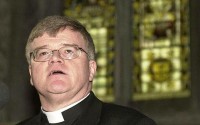 Why is Jeffrey in our top ten? Quite simply, with a huge number of Diocesan Bishoprics up for grabs over the next 12 months and with the House of Bishops indicating very clearly that being a celibate homosexual (even if you’re in a Civil Partnership) is no bar to wearing purple, will 2014 be the year that the Dean of St Albans moves one more rung up the ladder?
Why is Jeffrey in our top ten? Quite simply, with a huge number of Diocesan Bishoprics up for grabs over the next 12 months and with the House of Bishops indicating very clearly that being a celibate homosexual (even if you’re in a Civil Partnership) is no bar to wearing purple, will 2014 be the year that the Dean of St Albans moves one more rung up the ladder?
Not without controversy, Dean John has been mentioned as on the short-list for Exeter this year, and the debacle over his nomination for Southwark in 2008 is now well know. That event led to Dr John threatening to sue the Church of England for discrimination, but conversations in quiet corners soon sent that idea packing.
If Jeffrey does get nominated for a Diocesan post (and nothing less than that will do for him) then expect the fireworks to start flying. It will make the fuss over his elevation and then demotion in Reading look like a walk in the park.
Number 5 – Very Revd Vivienne Faull
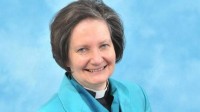 In some senses Vivienne is exactly where we put here last year (number five) but in another regard she is moving rapidly towards landing one on the Church of England’s coveted top jobs. As one of the eight female representatives on the House of Bishops she is now sitting with the boys with the power and given that the path towards Women Bishops appears to be pretty well clear for 2014, our prediction last year that she would be one of the first, if not the first, women bishops is looking better and better month by month. As I wrote last year, Vivienne stands out as a well-loved and highly regarded and appreciated candidate across the theological spectrum (unlike the more divisive figures like June Osborne, Christine Hardman or Judith Maltby) for the highest office.
In some senses Vivienne is exactly where we put here last year (number five) but in another regard she is moving rapidly towards landing one on the Church of England’s coveted top jobs. As one of the eight female representatives on the House of Bishops she is now sitting with the boys with the power and given that the path towards Women Bishops appears to be pretty well clear for 2014, our prediction last year that she would be one of the first, if not the first, women bishops is looking better and better month by month. As I wrote last year, Vivienne stands out as a well-loved and highly regarded and appreciated candidate across the theological spectrum (unlike the more divisive figures like June Osborne, Christine Hardman or Judith Maltby) for the highest office.
“My Lady, Bishop Faull of Derby” has a certain ring to it don’t you think?
Number 4 – Revd Sean Doherty, Revd Sam Allberry, Ed Shaw
 Three people for one slot again I hear you ask? Why yes, why not? Sean, Sam and Ed are the team behind Living Out, the new project designed to look at issues of human sexuality from a conservative perspective. What is the most remarkable thing about Living Out is not the great variety of personal testimonies from different experiences but rather the large number of endorsements from across the Evangelical spectrum.
Three people for one slot again I hear you ask? Why yes, why not? Sean, Sam and Ed are the team behind Living Out, the new project designed to look at issues of human sexuality from a conservative perspective. What is the most remarkable thing about Living Out is not the great variety of personal testimonies from different experiences but rather the large number of endorsements from across the Evangelical spectrum.
What Living Out represents is a shift in the centre of gravity for conservatives talking about issues of human sexuality. For too long the debate has been dominated by “white straight males” on the Evangelical side. OK, Sean, Sam and Ed are white and male but they bring a refreshing voice to the discussion as finally homosexual evangelicals who take a conservative position are speaking out and being heard.
As the post-Pilling Church of England moves into a discernment process on these issues, any diocese that avoids having voices like these as part of the discussion are going to find themselves with questions to answer. For too long “GLBT Anglican voices” has meant a particular liberal position. No more is that the case.
Number 3 – Rt Revd Nigel Stock
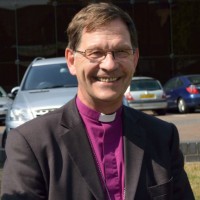 The restoration of the position of “Bishop in Lambeth” by Justin Welby has shown that the Archbishop of Canterbury is serious about creating a team around him to get the job done. Before moving to the South Bank Nigel was Bishop of St Edmonsbury and Ipswich, one of the most rural of all dioceses, and he understands the pressures of keeping the Church of England going in a society where church attendance is collapsing.
The restoration of the position of “Bishop in Lambeth” by Justin Welby has shown that the Archbishop of Canterbury is serious about creating a team around him to get the job done. Before moving to the South Bank Nigel was Bishop of St Edmonsbury and Ipswich, one of the most rural of all dioceses, and he understands the pressures of keeping the Church of England going in a society where church attendance is collapsing.
Already he’s made himself a bit of a reputation as a fixer (or is that a yes man?). Appointed as one of the Archbishop’s representatives to the Channel Islands to try and sort out the mess the Bishop of Winchester has got himself into, first impressions were that Nigel was not a man to be messed around with. Whether that will be a strength or a weakness remains to be seen.
Expect to the see the Bishop at Lambeth more and more in the news this year as he works as Justin’s XO.
Number 2 – Most Rev Eliud Wabukala
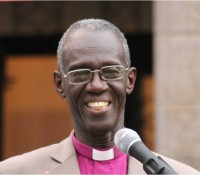 The Archbishop of Kenya makes our number two slot, despite not being a member of the Church of England. He is however the Chair of GAFCON and in that position may have an important influence over the Church of England for the next few years. Certainly, the Archbishop of Canterbury thought the Nairobi GAFCON conference was so important he made a specific journey over to Africa to speak personally, having already prepared a video address.
The Archbishop of Kenya makes our number two slot, despite not being a member of the Church of England. He is however the Chair of GAFCON and in that position may have an important influence over the Church of England for the next few years. Certainly, the Archbishop of Canterbury thought the Nairobi GAFCON conference was so important he made a specific journey over to Africa to speak personally, having already prepared a video address.
The dark forces of schism are hovering over the horizon in England and Eliud has made it more than clear that he sees the Pilling Report as “very flawed” and will not stand by if the more dramatic of the recommendations are implemented. His passion for saving “the historic Mother Church of the Communion” is not to be under-estimated and he represents a growing willingness to engage in border-crossing into the very heartland of Anglicanism itself.
Expect statements out of Kenya to be taken very seriously in Lambeth Palace in 2014. The “sleeping giant of Anglican orthodoxy” as Wabukala himself described the Anglican Global South movement is waking up and in a battle for the soul of England there may come a time when no prisoners are taken.
Number 1 – Most Revd Justin Welby
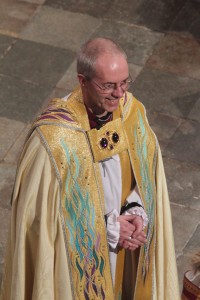 He’s charismatic, he can render the veteran BBC Journalist John Humphrys lost for words (no mean feat), he’s got the coolest middle name of the whole House of Bishops; 2013 was a pretty good year for Justin Portal Welby. Propelled from relative obscurity, the man who only two and a half years years ago was Dean of Liverpool Cathedral is now the Metropolitan of the Church of England with the weight of the Anglican world on his shoulders.
He’s charismatic, he can render the veteran BBC Journalist John Humphrys lost for words (no mean feat), he’s got the coolest middle name of the whole House of Bishops; 2013 was a pretty good year for Justin Portal Welby. Propelled from relative obscurity, the man who only two and a half years years ago was Dean of Liverpool Cathedral is now the Metropolitan of the Church of England with the weight of the Anglican world on his shoulders.
He’s already begun a quick-fire tour of the provinces of the Communion and there’ll be more of that over the next few months. He’s fast to learn and adapt to environment (note how he completely changed his sermon in Kenya during the GAFCON meeting from one service to the next) and he has the kind of self-deprecating humour that endears him to most folks he meets. On top of that he has the respect of his peers (literally) in Parliament where as a driving force on the Parliamentary Commission on Banking Standards he has helped to frame crucial legislation that will be moving forward this year.
There are however pitfalls ahead for Welby. Women Bishops is not through yet and attempts to put off the human sexuality debate for a few years (“facilitated conversation” is a wonderful thing) may be torpedoed if Jeffrey John gets a Bishopric. On top of that the House of Bishops still haven’t sorted out how they’re going to handle same-sex marriage and when it does guess who will get the public approbation for it? At some point the honeymoon has to end.
Turbulent priest? The next 12 months may be rocky but we’ll get to see what kind of man Justin is when times start getting rough.
Yes, I know there are only two women on the list and only four unordained folks. The point of the list is to point out people who will make or shape the news in 2014 – the fact they all happen to be men or ordained is irrelevant. Last year’s list was more balanced but it just so happens that this year’s list isn’t. And for those complaining about “celebrity culture” most of the people on this list aren’t celebrities. That’s the whole point.
How should Colin Coward respond to those who believe that homosexual relationships are sinful? If they’re unwilling to so much as tolerate the expression of gay sexuality in the church, no amount of politeness will bear fruit. You can’t sweet talk someone out of a firm belief.
I agree about Eliud Wabukala and Gafcon. As the provinces are not only irreconcilable, but talking different languages, I hope the Communion faces up to the inevitable schism, and handles it as amicably as possible.
CC’s response should, of course, be to repent – since homo*sexual* relationships aren’t just sinful according to some people’s beliefs, but are against God’s will.
He, obviously, disagrees. Since there’s no way to prove God’s will, he’ll go on disagreeing. As will I. My question is how Coward ought to proceed given the reality of that disagreement.
Who cares if a retired civil servant ticked him off for tone? This isn’t personal to Sir Joseph, is it? The report that Pilling produced, with its artificial neutrality, is nothing to be proud of.
Forget Pilling, Peter’s point is that Colin Coward has even alienated the middle ground: ‘he’s put quite a few people in the middle ground off by his constant insistence that the traditional position on human sexuality is intrinsically homophobic and irredeemable.’
In contrast, many liberal theologians, including Tobias Haller, do not advocate a root-and-branch damnation of the church’s tradition.
It’s not clever to polarise the homosexuality debate in opposition to the self-same middle-ground majority whom his pressure group seeks to influence.
He must be hoping that the church will bow to secular pressure, because that majority of its moderates won’t be swayed by even the best of his thinly-disguised self-pitying guilt trips.
It’s already polarized.
Soft-soaping the traditional position could also fail, as it makes life easy for its adherents. Few moderates will want to be thought of as advocating homophobia.
James, it’s a bit wierd that you think that people (straight or gay) who support Christian teaching on sexual righteousness are homophobic!
In line with this blog’s comment policy, I’ve made no such claim: I was merely commenting on the effectiveness of that approach.
The issue is where the polarisation occurs. Hitherto, Colin Coward had attributed homophobia to a vociferous minority. You admit that “Few moderates will want to be thought of as advocating homophobia.’ Colin Coward”s rants against moderates won’t make them think they are.
However much you and Colin Coward cry foul, few Christians will consider their application of traditional tools of interpretation to scripture as advocating homophobia.
Of course, you could try re-defining homophobia as anything short of fully endorsing the panoply of statistically higher risk homosexual behaviour. Even the medical profession disagrees with that tack.
Moderates, by their nature, recoil from conflict and extremes. If they know that society views a position, and those who hold it, as repellent, odds are they won’t hold it.
I suspect that’s why Coward’s ridiculed for not playing nice. So long as he’s behaving himself, he’s no threat. If he ignores the ridicule and ploughs on, he is. Delegitimizing and marginalizing a position is an extremely effective tactic.
Anyone can attempt at becoming a threat. A minor republican newsletter can lay claim that its very circulation is a threat to the monarchy. A credible threat? i think not.
The tactic of applying secular pressure to moderates (‘If they know that society views a position, and those who hold it, as repellent, odds are they won’t hold it.’) might work if those people were willing to reject the scripture as their frame of reference. A better tactic would be to convince them that even traditional methods of interpretation lead to a liberal conclusion.
Unfortunately, in our episcopal polity, a change of heart among moderates on the basis that the traditional reading of scripture is homophobic might only influence them to leave the church allowing extremism to replenish the vacated majority: the very opposite of what you claim might be intended by Colin Coward’s ‘clever’ tactic. A spectacular own-goal.
No moderate exodus has followed the decision to ordain women, despite the clarity of the biblical and traditional prohibitions on women holding authority, speaking in church, and joining the apostolic succession.
If moderates think about biblical authority much at all, they’ll quietly “reinterpret” scripture. Nothing in what Coward’s said blocks this route, does it?
The pressure isn’t just secular. A great many Christians are appalled by the traditional position, for theological reasons. That pressure, united with secular revulsion, is a powerful catalyst for change.
Neither the decision to ordain women, nor permitting the re-marriage of divorcees in church affected the behavioural ideals of the church. They are invalid comparisons.
Your second paragraph pretty much agrees with mine. Moderates re-interpreting scripture will involve convincing them that even traditional methods of interpretation lead to a liberal conclusion. However, Colin Coward has not taken this approach. He simply denounces those methods as evil.
The revisionist argument in favour of women bishops was actually underpinned by the sort of reasoned theological arguments that are sadly lacking in Colin Coward’s tirades.
You claim ‘A great many Christians are appalled by the traditional position, for theological reasons’. I’d like to see hard survey evidence. The polls show that the divergence of views on homosexuality largely correlates with age and religious affiliation.
In terms of age composition of Synod: ‘According to the Church Times for 5 November 2010, based on a briefing from the Secretary General of the Archbishops’ Council, the average age of members of the House of Clergy rose from 49 in the 2005 Synod to 52 in 2010, and of members of the House of Laity from 53 in 2005 to 58 in 2010.’ (source: BRIN)
Just to be clear on homophobia, Stonewall issued a document identifying its hallmarks. It goes way beyond reasoned disagreement.
1. verbal abuse by name-calling, offensive mimicry and physical threats or attacks
2. mockery of subject, career choice or person’s contributions to work
3. defacing of property and graffiti
4. inciting others to behave in a homophobic way
5. mockery of a person’s demeanour or way of speaking
6. refusing to co-operate in work and play (refusing to sit next to someone).
While secular pressure and the fear of alienation are real, they will only encourage the church to seek to eradicate the sort of behaviour listed above. Colin Coward has been unable to add anything substantive to the debate that could sway either House to take a dim view of the behavioural ideals that undergird the traditional moral prohibitions against homosexual acts.
But he isn’t free to disagree – if he wants to be a faithful disciple and Christian minister. Homo*sexual* relationships are rejected in the Christian book of God’s revelation and in the ‘book’ of God’s creation (the way things are). If he doesn’t repent he will probably go the way of so many liberals who started by rejecting an important Christian belief and ended up not believing in the Christian God at all. In fact maybe he already has rejected the authority of the books of Scripture and Nature – in which case his best way to proceed might be to be honest about that, so that everyone is clear about where they are coming from?
Christians disagree both about the nature of revelation and what the Bible says. Given this, what practical way forward would you suggest?
I’d say toleration where possible, schism where not.
JB – what we need is some decent teaching and discipline by the Bishops – to explain and defend the Christian worldview, beliefs and morals set forth in our Scriptures, by GS87, by Lambeth 1.10 and at the Primates’ meetings – rather than just looking for a compromise to keep the CofE together and minimise upset among the political class.
Even the Lambeth Conference doesn’t claim to be infallible, and the Anglican Communion is autocephalous. Lambeth was wrong in ’98 and it’s wrong now.
The current position is unsustainable. Question is, what follows it?
Ah the delights of liberalism… being able to make moral judgements without having to bother to defend your beliefs. JB – The current teaching is correct. Human biology and physiology, the Bible’s inspired writers (BC and AD), the historical churches, GS in’87, the HoB in 1991, Lambeth in ’98 and the Primates in ’05 all say so. Who are you to know better?
The only unsustainability is in not teaching this Christian truth clearly.
Nothing to the delights of dogmatism: right-thought taken off-the-peg. So very convenient!
Who am I? Who are you? Who are they? The question betrays its creed: not why, but whom. Source, not merit, is what matters.
Appeals to authority are a fallacy for good reason. If you like, look it up, get back, then we can talk.
“Source, not merit, is what matters.” Yes, I agree – and they spoke authoritatively because they spoke the truth, based on fact and divine revelation.
James, the argument really rotates around worldview and authority. The Church follows Jesus’ and the apostles’ teaching, and we live for a new kingdom where righteousness is at home and sin and death are destroyed. That’s why it’s worth taking up your cross and following Jesus – even when it comes to sex and relationships
I disagree with authoritarianism, and believe we lack the ability to perfectly discern revelation (if it even exists).
Given these different frameworks, based on different premises, how d’you think the church should handle the disagreement?
“You can’t sweet talk someone out of a firm belief” You are absolutely right……. but you can’t insult someone out of a firm belief either and trying to do so only makes people think you are nasty and petty as well as wrong. In contrast, if you behave politely and lovingly they may at least come to respect and like how you are as a person even if they
believe that what you are advocating is unbiblical.
Phil – could you update your Disqus profile so it shows your name? Thanks.
Sorry – I hadn’t a clue what I was doing when I first registered with Disqus…..and it is a little bit scary to have a name online so I never bothered to change it!
It’s not about those of firm belief: it’s about the middle, the moderates of whom MLK was so scathing in Letter From Birmingham Jail.
So long as Coward is polite and respectful, there’s no pressure on them to stand up and be counted. This is a cosy, abstract “issue,” with two equal “sides,” and no time limit.
If they’re met, week after week, with scorn, from inside and outside the church, there’s immense pressure for them to stand on the side of justice. The civil rights movement was as loving as it could be, but it was never polite.
Welby at #1? Seriously? One hopes that you doled that position out of polite deference, but I see that the purpose of your list is to define who will have *impact* in the coming year. Hence my confusion. So far Welby has done nothing to indicate desire to have any impact on business as usual. I think the conventional wisdom of the ABC’s performance at GAFCON was that he fooled no-one, especially not the Nigerians or Kenyans, let alone the Americans. And all that shuttle diplomacy Welby has been trying to do is an utter show stopper. Sorry, but this cleric views Welby as being little more than a time server and no friend of theological orthodoxy. Just another senior cleric trying to foist continuing indaba on the Communion and with neither the power nor ability to firmly rebut the forces of compromise therein.
I do agree with your inclusion of Dr. Lee Gatiss, however. Now there’s a man who knows what he believes and is willing to defend it. Church Society will do well with him at the helm.
In terms of who will shape the CofE in the next year Welby is top of the list
Hopefully he will shape the CofE according to God’s will and do his best to promote Christian discipleship to society as the best way to live…. rather than shaping the CofE according to current society’s will and doing his best to present *conformance* to the Church as the best way to survive!
What if justice, not culture, motivates the change?
Many Christians believe that affirming LGBT people is God’s will. It isn’t a view driven by conformity to fashion, but by the revelation of evidence and experience. You don’t see a similar push amongst Christians to conform to, say, neo-liberalism, do you?
JB wrote “What if justice, not culture, motivates the change?” Err, Everyone deserves justice…. But I’m sure that even you would agree that there are some sexual desires people experience that they should not act on…. So the primary issue is righteousness, not justice.
And No, The real issue IS cultural – western society has shifted its moral absolutes. Personal volition has been prioritied for decades (as in “I’m OK, you’re OK” and “do what you want as long as it doesn’t hurt anyone”). Now our culture has decided that there are people who are not OK, because they disagree, and that it is OK to be crassly nasty towards such ‘heretics’ and ‘blasphemers’.
And it isn’t a very good argument that some Christians now agree. Firstly, there is the huge media influence and legal pressure, secondly many people have not had Christian teaching on sex presented to them well, and thirdly if something isn’t God’s Will, Christain leaders have the duty to behave, teach and disciple accordingly because unrepented sin excludes you from the kingdom of God.
Righteousness is justice.
Religion has always existed in a cultural context: I don’t see why we should be prisoner to the cultural norms of the 1st century. Free-floating revelation can always be claimed, but many Christians don’t believe in it.
If you value diversity of opinion, would you allow the church to tolerate the expression of both gay people’s sexuality and those who want to live in accordance with traditional teaching?
On a slighly different tack – I’d be interested to know your views on the “Living Out” approach.
I respect them for making a substantial personal sacrifice for their beliefs, while thinking it’s tragic that they feel it necessary.
If they’re willing to allow other clergy to do differently, they should be free to follow their own path.
Thanks for the reply. Although I am on the other side of the argument I am really interested to know what people on both “sides” think of Living Out’s approach. Part of the trouble of course is that our society sees having sex as so essential to happiness….. changes in society post the free love of the sixties I suppose. Bob Dylan’s “times they are a changing” was more prophetic than he knew!
Err, that’s reductionist. Justice is part of what it jmeans to love neighbour as self – one (important) aspect of righteousness.. But there are other important aspects to do with the first commandment – to love God with all that we are – heart soul mind and strength. And every prophet, apostle and Jesus, who addressed sex always insisted that all forms of fornication are unrighteous – ie sin (Jesus even included lusting).
And whereas cultural contexts have changed, the nature of being human , and God’s nature, haven’t.
The Church, from St Paul on, has always valued all sorts of people and insited that we are all one in Christ. She has held that some things are just cultural issues where diversity can be enriching. She has also held that some issues are important but secondary (eg legalism over special days or abstaining from alcohol) but she has also insited that some things are important and primary. And sexual sins have always been in the latter category.
So in this case the issue is finding and obeying the truth, not valuing error.
ps I suspect that you would actually agree on this. Isn’t it a primary issue to you too? Do you really want to tolerate the “opinion” that homosexual relationships are unrighteous and to be repented of?
So for you, justice is one component of righteousness? Fair enough, but in that case, righteousness can’t be set against justice. They’re indivisible.
I don’t like the view that “homosexual relationships are unrighteous and to be repented of” in the least, but also believe in toleration and free speech. So long as clergy and laity don’t try to impose their beliefs on others, they should be free to hold and express them.
Isn’t it the clergy’s job to impose their beliefs on others? If not, what are they doing up in the pulpit every Sunday?
Giving their opinion, that’s what.
Even if you think it’s desirable to impose beliefs, it’s not possible.
Well, if it’s not possible, what do you mean when you say that they shouldn’t do it?
I mean that the rules shouldn’t impose beliefs, i.e., by compelling members of a church to be celibate outside heterosexual marriage.
Next time someone at your church proposes sacrificing a goat to Baal and the leadership says no, remind them that the rules shouldn’t impose beliefs.
Darn, I was gonna run with Aphrodite (or maybe the collected Lords of Kobol — we could offer up some DVD boxsets).
That was, of course, referring to a particular type of belief. Difference being, simply, that a prohibition on Baal (or Kobol) worship in churches can be applied regardless of sexual orientation.
As can an instruction not to have sex outside of marriage.
Since banning sex outside heterosexual marriage disproportionately affects lesbians and gay men to a massive degree, not the case.
What do you mean? How are these rules being imposed? Do we follow people home from church? Do we put secret cameras in their bedrooms to catch them out? Do we haul them up in front of church courts and fine them?
No courts or telescreens. Instead of due process, there’s a climate of fear, with Jeffrey John’s experiences held up as a warning. (And this is a man who followed the rules as they stand: a better example of arbitrariness you couldn’t ask for.)
Ah, I see. The fateful ‘don’t ask don’t tell’ mess that tripped up Jeffrey John. But I’m talking about what vicars teach to lay members of the church. We’re at cross purposes.
You’re totally right about your assessment of Welby’s message to GAFCON. Nevertheless, his inactivity to deal properly with heresy in the Communion (like Williams’ before him) will have profound effects upon us all. I think he’s rightly #1, if not for the right reason.
This is really sad –
1. He’s only been in place a year – time to make some personnel changes but not much more.
2. He quite rightly said he has some influence but no power, even in the C of E (well he said something like that when he first became ABC). I don’t think he even gets to choose the new bishops, or at least I wasn’t aware of him being on the selection committee for our diocese’s recent appointment.
3. If you want to influence people on an emotive subject like sexuality, my view is that your best bet is to be careful about your public pronouncements, which he is, and to talk to the people concerned privately. This approach may not have immediately obvious results but I would have thought is quite a wise way to do things, especially if you are as passionate about unity as ++Justin is. I personally wonder if the time for “dealing with” may have to come (if indeed he has the power which he may not), but public pronouncements can so easily be misread as hatred not the truth which is intended. I think it is significant that the English bishops advocated waiting and not splitting when things were discussed at the GAFCON conference (If I remember rightly). They know ++Justin and his views personally.
What’s strange about this list is that, apart from perhaps the Bishop of Birkenhead, this is no more than a list of political operators.
In contrast, the early church achieved more radical change with far less political influence. I doubt that the ‘Top Ten’ will be able to halt the decline in Anglican attendance. They may be power-brokers, but there’s little evidence of them being the brokers of divine intervention.
I think the most influential Anglicans might actually be people who are unknown to the wider world. Only eternity assesses our real sphere of influence. Nice article tho.
I actually think you’re right Lyndsey. The problem is that sadly people just doing their job well never makes the news.
Thanks Peter!
It could be that very early in the New Year Guernsey and Jersey will be
removed from the Diocese of Winchester altogether in preparation for the
creation of a new diocese of the Channel Islands in 2015.
In your dreams.
Wait and see…
Hmm. To avoid creating more dioceses when the CofE is trying to cut down, the CI could be put into Europe – which is used to dealing with multiple jurisdictions.. Or what about Sodor and Man!…. the Diocese of the Crown Dependencies anyone?